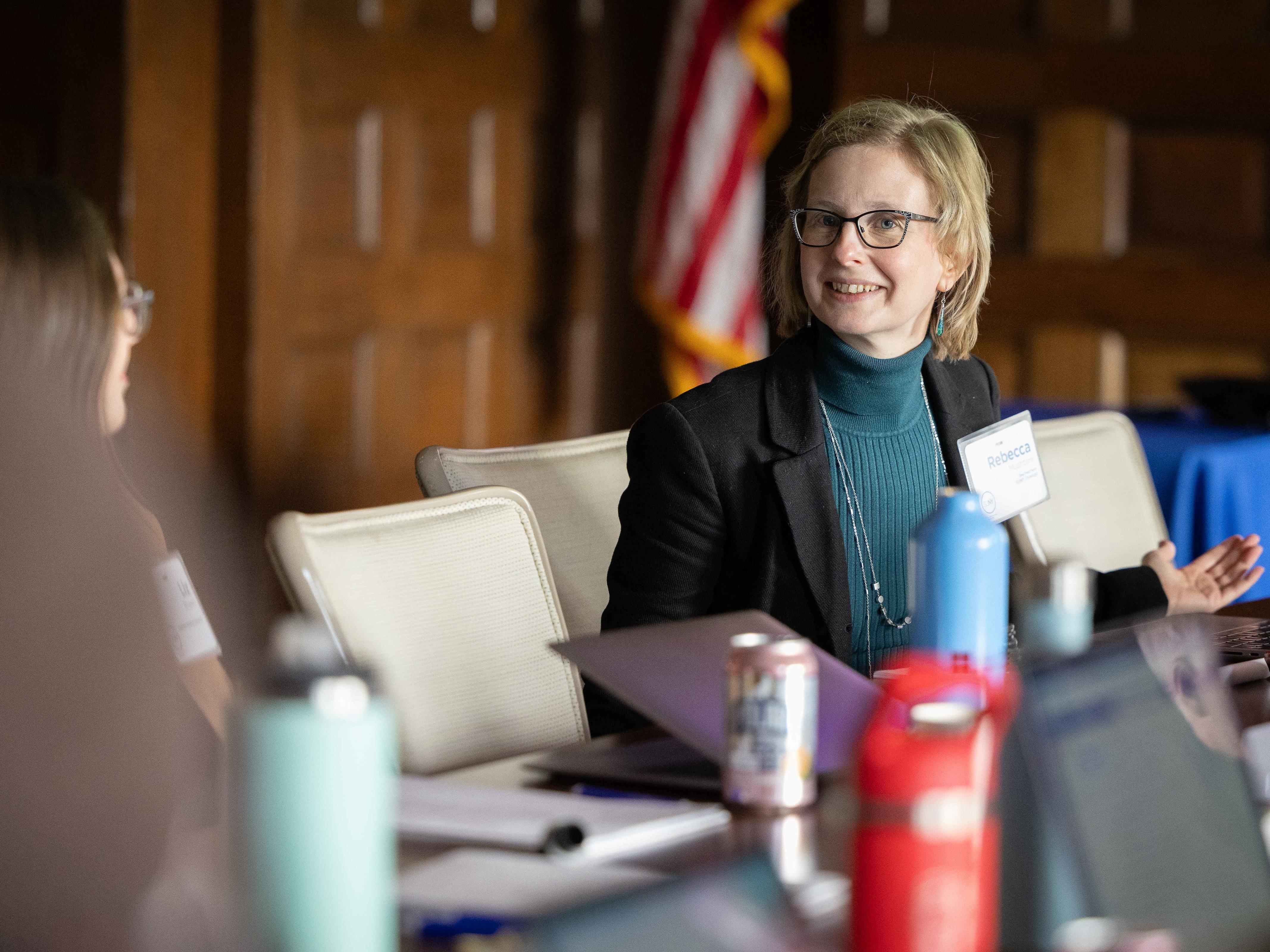SUNY Oswego’s Rebecca Mushtare will facilitate the new SUNY Accessibility Advocates and Allies Faculty Fellowship Program. (Photo by SUNY/Valerie Caviness)
SUNY Oswego’s Rebecca Mushtare will play a key role in a new SUNY-wide effort supporting digital accessibility, State University of New York Chancellor John B. King Jr. announced on Jan. 8 with the launch of the inaugural fellows for the SUNY Accessibility Advocates and Allies Faculty Fellowship Program.
A total of 11 fellows from across the SUNY System will work to expand digital accessibility and Universal Design for Learning (UDL) practices across their campuses, which is crucial for student success.
“There is a place at SUNY for every New Yorker, and we are committed to excellence and inclusivity across our 64 SUNY campuses,” Chancellor King said. “The work of our inaugural Accessibility Fellows is crucial to ensuring our faculty have the support to consistently adopt inclusive teaching practices to guarantee student success and upward mobility.”
Mushtare, an experienced art and design faculty member and associate dean of graduate studies, has successfully worked with Oswego’s campus leadership to cultivate a culture of access. Her efforts will make an even broader impact as she facilitates this fellowship, which lasts a full calendar year. The fellowship is organized into three phases that are allotted four months each: discovery and analysis, design and development, and implementation and evaluation.
“I am honored to build upon the accessibility work at SUNY Oswego at the system level and look forward to collaborating with this knowledgeable cohort of SUNY faculty colleagues,” Mushtare said
“Proactively addressing accessibility during the design phase of programs, curriculum, content, materials, environments and experiences is essential to a more inclusive culture,” Mushtare noted. “Supporting faculty champions, like the SUNY Accessibility Advocates and Allies Faculty Fellows, who can engage a team across their campus, is key to advancing this work across disciplines and empowering all content creators, including students.”
The SUNY Universal Design for Learning Project team reached out to Mushtare to help expand SUNY Oswego's successful Faculty Accessibility Fellows program across all SUNY campuses.
Mushtare collaborated with contacts from SUNY and from her own campus to design a program that could build faculty leadership capacity across campuses supporting accessibility and universal design for learning.
“While both the SUNY Oswego and SUNY-wide programs share core components, the SUNY Accessibility Advocates and Allies Faculty Fellowship program emphasizes advocacy and leading change,” Mushtare said.
She hosted a kick-off event in Albany in early January with SUNY Oswego Chief Technology Officer co-presenting about some of Oswego’s successful programs and strategies.
Supporting inclusion
“Accessibility at its most fundamental level is a basic human right,” Mushtare said, citing Article 9 - Accessibility of the UN Convention on the Rights of Persons with Disabilities. This calls for equitable access across all aspects of daily life, including buildings, education, information and more.
“In a classroom context, if accessibility guidelines are met, then students have access to content for an assignment immediately,” Mushtare explained. “When guidelines are not met, students who use assistive technologies like a screen reader or a braille display may have significant delays that often snowball and put a student behind in a course.”
Mushtare noted that creating accessible environments, experiences and materials ultimately CAN benefit everyone.
“For example, captioned videos help not only the deaf and hearing impaired community, but also those in noisy environments, with weak internet connections or for whom the video is not in their first language,” Mushtare said. “Similarly, automatic doors benefit people using wheelchairs, pushing strollers and making deliveries. In other contexts, like a global pandemic or other crisis, it can be the difference between someone having access to important health and safety and not having that information at all.”
That means, in everyday life, it takes a village to live up to this responsibility.
“Digital accessibility is something we are all responsible for because we all create and share digital materials — emails, social media posts, documents, presentations, etc.,” Mushtare said. “Tools like Microsoft's built-in accessibility checkers and Grackle for Google Suite can help ensure our digital content is accessible. Our campus also has a great accessibility website (oswego.edu/accessibility) that is full of resources to help folks get started.”
Students with disabilities self-identifying with their campus Disability Services or Accessibility Resources offices are increasing as a share of total enrollment, with over 10 percent of students enrolled across the SUNY system. This number does not capture the many students who do not self-identify with the student disability office, either because they might not know they are eligible or have chosen not to disclose due to a wide variety of reasons, including stigma, SUNY officials said. SUNY has invested $10 million in annual recurring state funding to increase support to students with disabilities at all State-operated campuses.
The SUNY Accessibility Advocates and Allies Faculty Fellowship program is co-sponsored by the SUNY Office of Student Success in partnership with the Office of the Provost and supported by the Universal Design for Learning at SUNY project. This cohort of fellows will establish a community of faculty leaders and champions committed to promoting and growing accessibility practices in and out of the classroom on their campuses. During this program, fellows will:
- Explore models and strategies to build and expand a culture of access on their campuses;
- Share their expertise and experience as they identify obstacles and work towards solutions to broaden adoption of accessibility practices;
- Connect with other communities of practice and campus leaders with a shared vision, including but not limited to: disability/accessibility directors, designed accessibility officers, chief diversity and inclusion officers, chief information officers, teaching center directors, directors of online learning, the SUNY Faculty Advisory Council on Teaching and Technology, instructional designers and others;
- Grow as faculty leaders as they coordinate with campus leadership to design and execute a plan to engage their campus community in the work of access.




